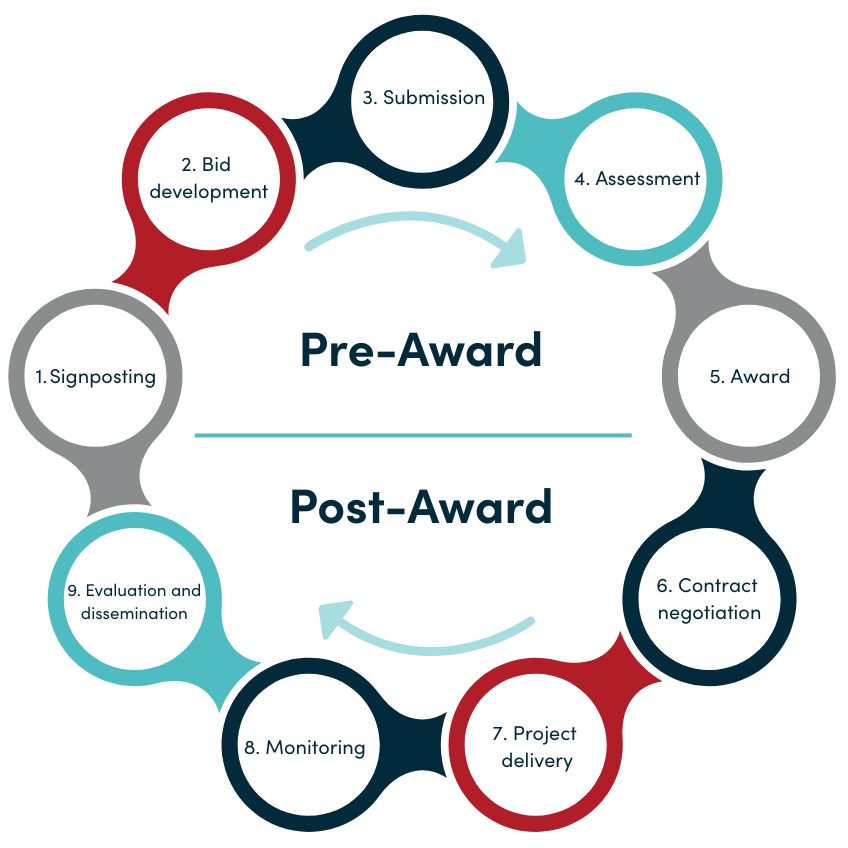Dive into the funding bid lifecycle, with our breakdown of each stage of bid writing.

Understanding the bid process is an essential part of securing funding, and taking a structured approach is key. At Life Sciences Hub Wales, our dedicated team of funding experts can support businesses, universities, and health and social care organisations in successfully navigating every stage of the bid lifecycle.
With high levels of competition and multiple organisations often applying for the same opportunity, a successful bid relies on a clear, well-defined writing process. Establishing a strong foundation from the outset is essential to stand out and maximise your chances of success.
This is the first blog in a series of three. Across all of these, we’ll break down the key stages of the cycle, share valuable bid writing tips, and explain how to make the most of your grant funding once it’s been awarded.
We now kick off the blog series by looking at what the bid lifecycle is, what we mean by bid writing and common misconceptions associated with this.
A solid understanding of the bid lifecycle can guide you through crafting proposals that secure funding. Our team is here to support you at every step of the application process. Visit our funding support page to get started.
What is the bid lifecycle?
The bid lifecycle refers to the structured process of identifying, developing, and submitting a proposal in response to a grant or funding opportunity, and the monitoring and management of the award once you are successful. It encompasses the full journey from concept to completion, ensuring both compliance and delivery against agreed outcomes.
The lifecycle consists of several key phases, and understanding each one is essential to writing an effective, competitive bid. Strategic planning across these stages can improve success rates and ensure the long-term sustainability of funded activities.
In the life sciences sector, proposals can span a variety of funding types, including research grants, collaborative partnerships, public sector contracts, and private-sector investments.
The bid lifecycle is typically divided into two overarching phases: pre-award and post-award.
Pre-award: This phase includes all activities leading up to the receipt of funding. It begins with shaping your initial idea, identifying suitable funding opportunities, preparing the proposal, and submitting the application.
Post-award: This phase begins once funding has been awarded. It includes contract negotiation, onboarding the project team, managing deliverables and budgets, tracking progress against milestones, and fulfilling all reporting and compliance obligations to the funder. It concludes with the formal closure of the project, which may include final audits, impact reporting, and knowledge dissemination.

Throughout both phases, effective communication, risk management, and clear documentation are key to maintaining funder confidence and maximising the impact of the funded work. Understanding the bid lifecycle not only improves your ability to secure funding but also strengthens your organisation’s capacity to deliver high-quality, impactful projects.
Our Funding Lead, Liz Rees, says:
“Without a clear understanding of each stage of the bid process, even the most innovative ideas can fail to secure the support they deserve.”
What is bid writing?
Bid writing is the process of developing a clear, persuasive document in response to a funding opportunity within the bid lifecycle. Often referred to as a bid or proposal, this document outlines how your organisation, or innovation, can meet the needs and priorities of the funding body. Whether you’re applying for a government grant, a charitable fund, or a research opportunity, the bid serves as a formal request for support, outlining your value proposition and proposed solution. Each funding stream may have its own expectations, timelines, and reporting obligations, making it important to tailor your approach accordingly.
Crafting a successful bid is both an art and a science. It goes beyond simply answering application questions, it requires strategic thinking, meticulous research, and compelling storytelling. At its core, it combines several key skills: the ability to interpret and respond to funder criteria, a strong understanding of your own organisational strengths and track record, and the capacity to communicate complex ideas clearly and convincingly. When executed well, a bid not only showcases a strong idea, it demonstrates your ability, credibility, and commitment to deliver meaningful outcomes.
As part of the bid, you may be required to explain the specific problem or need your project addresses, providing evidence or data to support its significance. Funders will expect a detailed explanation of your proposed approach, including the rationale behind it, the expected outcomes, and the long-term impact. They’re interested in understanding who will benefit from your work, how the project will be managed and delivered, and what mechanisms are in place for evaluating its success.
At every stage of this process, our funding team is here to support you. From identifying the right funding opportunities to reviewing and refining your final submission, we offer expert advice, feedback, and strategic input to help you shape a competitive bid that stands out.
To make things easier, we’ve put together a handy funding toolkit, packed with ready to use templates from Gantt charts to risk registers, so you don’t have to start from scratch. These resources are designed to help you cover all the essentials while staying focused on your project’s bigger picture and long-term goals. Get in touch with our team at fundingsupport@lshubwales.com for more information.
Common misconceptions about bid writing
Despite being a key part of securing funding, bid writing can feel daunting, often due to a few common misconceptions. Let’s debunk some of the most common myths that could be holding you back, and how we can help you with these.
“You need a full-time bid writer to be successful”
While professional bid writers can be helpful, they’re not essential. What truly matters is a clear, compelling narrative, alignment with funder priorities, and careful attention to detail. With the right structure and support, skilled teams can write strong, competitive bids.
How we help: We offer guidance, feedback, and hands-on support to help build your bid writing confidence, no need for external consultants or additional costs.
“If we don’t win, the bid was a waste of time.”
Not true. Taking the time to write down you innovation idea helps clarify your strategy and align your team. It helps iron out any uncertainties, confirm what stage you are currently at, where you would like to go next and what you need to get there. Plus, a well-structured bid can always be recycled for future funding opportunities, while utilising the funders feedback can help strengthen your proposal for next time.
How we help: We help you reflect on and refine unsuccessful bids to boost your chances of success next time. Ensuring no effort is wasted.
“Only large organisations or universities get funded”
While larger institutions may have more experience with funding applications, many grants actively encourage applications from clinicians, healthcare professions, start-ups, small businesses, and new collaborations. Funders prioritise innovative ideas with clear impact, not just big names.
How we help: Our team has had many successes with smaller organisations, as well as the larger named ones. It’s all about helping you find the right collaboration and communicate the value of your idea in a compelling way that aligns with the funder.
“The hardest part is submitting the application”
Submitting your proposal is a major milestone, but what happens after, from award acceptance to project delivery and reporting, is just as important. Poor post-award management can affect your current and future funding success.
How we help: While we don’t provide post-award services as this will be specific to you and the fund administrator, our team’s extensive grant management experience means we consider the entire project lifecycle, from planning to reporting when crafting your bid. We build strong, delivery ready proposals that support a smooth transition into project execution.
Contrary to popular belief, the bid process is often more transparent than it seems. Funders are committed to fair, objective evaluation that aims to fund proposals that show innovation and deliver the best value for money.
Whether you're new to bid writing or looking to strengthen your approach, our support is tailored to your unique journey. We're here to help you unlock funding opportunities and bring your ideas to life. Get in contact with our funding team to find out more by emailing fundingsupport@lshubwales.com.

